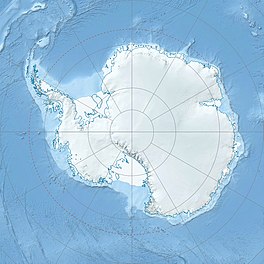Conger Glacier (66°2′S 103°33′E / 66.033°S 103.550°E) is a glacier 5 nautical miles (9 km) east of Glenzer Glacier, flowing north into the eastern part of the Shackleton Ice Shelf. It was mapped by G.D. Blodgett (1955) from air photos taken by U.S. Navy Operation Highjump (1946–47). It was named by the Advisory Committee on Antarctic Names for Richard R. Conger, chief photographer's mate with U.S. Navy Operation Windmill (1947–48), who assisted in establishing astronomical control stations along the coast from Wilhelm II Coast to Budd Coast.[2]
| Conger Glacier | |
|---|---|
 Map of Antarctica, with Wilkes Land slightly to the right | |
Location of Conger Glacier in Antarctica | |
| Location | Wilkes Land |
| Coordinates | 66°58′00″S 109°00′00″E / 66.96667°S 109.00000°E |
| Length | 5 nautical miles (9.3 km; 5.8 mi) |
| Thickness | unknown |
| Terminus | Shackleton Ice Shelf |
| Status | collapsed[1] |
On 25 March 2022, it was reported that Conger Ice Shelf had collapsed around ten days earlier, as evidenced by satellite data. The collapse had not been anticipated by experts, although a gradual shrinking of the glacier had been observed since the mid-2000s, and a more rapid one since early 2020. Whether the collapse was related to the preceding abnormally high temperatures in the area was not immediately clear. An ice shelf is a large floating platform of ice that forms where a glacier or ice sheet flows down to a coastline and onto the ocean surface; it stops a glacier from rapidly flowing into an ocean.[1]
See also
editReferences
edit- ^ a b Lu, Donna (25 March 2022). "Satellite data shows entire Conger ice shelf has collapsed in Antarctica". The Guardian. Retrieved 26 March 2022.
- ^ "Conger Glacier". Geographic Names Information System. United States Geological Survey, United States Department of the Interior. Retrieved 21 November 2011.
- This article incorporates public domain material from "Conger Glacier". Geographic Names Information System. United States Geological Survey.
